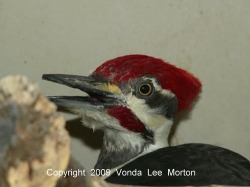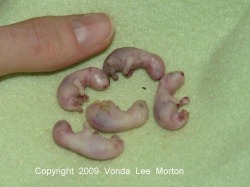2009 has gotten off to an inauspicious start, rehab-wise. Oh, sure, I took in more animals this January than ever before, but of those 10 intakes, two required euthanasia, six were DOA, one died the night she came in, and one was transferred.
Let’s start with the transfer: Boadicea, the adult red tail, is doing well at last account. Steve Hicks of Bubba & Friends says she’s eating on her own now and might actually be seeing a little out of that injured left eye. He also says she’s even feistier now than she was while I had her, which is a good thing. We want feisty raptors!
Of course, Harvey Wallbanger, aka Harvey Hammerhead, is still with me; he’ll go in this week for another X-ray on his wing and if it’s healed as it should have, we’ll leave the wrapping off and let him begin to use it within the confines of his pen. No free flight for this guy yet!
The 6 DOAs were heartbreakers: late last Saturday night, I received a call from someone on the coast whose dog had just killed a possum with babies in her pouch. Although I gave the caller the names of several rehabbers closer to the coast, none of them were available, so we ended meeting halfway, which was about an hour’s drive (one way) for each of us, in heavy fog.
Because the mother was already dead, time was of the essence in getting the babies off her nipples and out of the pouch. This is easier said than done, as for the first two months of their lives, baby possums are basically vacuum-sealed to the nipple. They migrate down the birth canal into the pouch, some 25 honey bee-sized newborns, to fight for 13 nipples. Their mouths aren’t even fully formed at this point: they are literally holes in their faces that will seal tightly to the nipple for about the next two months. Premature removal from the nipple can result in death.
I explained to the caller that the babies had to be removed from the nipples before the mother’s body temperature dropped and gave instructions on the removal process, warning that they might die as they were removed. Surprisingly, all five survived removal but died as I rushed them home. They were simply too young to survive the stress. Fellow rehabber Lynn Schlup & I guessed that they had probably been born that day and still had siblings in the birth canal when the mother was killed.
The sixth DOA was an immature (a first-year) Cooper’s hawk. The caller who spotted this bird sitting in the yard for several hours thought he was dead when I arrived, but he was still barely alive. Now, understand, Cooper’s hawks are psychotic little snots. You just don’t handle them without gloves. This guy was so far gone that I picked him up barehanded and held him in my lap with the heater vents blowing full-blast on him as I rushed against time to get him to Smalley’s. I’d called ahead and told them this bird was critical and they were on high alert, but he began having seizures and died just a block away from the clinic. We examined him, anyway, to see if we could pinpoint the cause of death, and as far as we could tell, he quite simply starved to death. Songbirds are a large part of a Coop’s diet, and we’d had several consecutive days (almost a week) of misty, foggy weather that had kept the songbirds fairly inactive. According to Steve Hicks, Coops burn energy at such a high rate that this could have been enough to cause him to starve to death.
And the intake that leads to my header for today was a six month old squirrel who’d been in captivity for six months and fed an improper diet. When I received the call about her, I assumed she’d just fallen from the nest, so imagine my shock at being handed a six month old squirrel who was in the final stages of MBD, a deadly but highly preventible bone disease that results from lack of calcium. I asked the person who brought me the squirrel if she’d been given calcium and was informed that she’d had all kinds of nuts. Okay, basic science lesson here, people: calcium is NOT a nut. You cannot get it from nuts, at least, not in sufficient quantities to stave off MBD. Furthermore, nuts are like candy. Children like candy, too, but would any conscientious parent make that the sole basis of their child’s diet??? I mean, come on here, folks! A little common sense, please!
This poor squirrel had lived her entire life in a cage, being fed nuts and cake and other highly inappropriate foodstuffs, and had reached the paralysis stage of MBD. I knew her chances were slim to none, but when her X-rays showed no spinal or pelvic fractures, Jim Hobby and I decided to see if we could at the very least mitigate the effects of the MBD. We both knew it was a long shot, and I even called Sarah Rowe of Columbus Squirrel Rescue, who agreed that we’d done everything possible and that we were probably fighting a losing battle. The squirrel died that night.
What infuriates me about this is that when I informed the person who brought me the squirrel that possessing wildlife without a permit is against state and, in the case of birds, federal law, I was told that the person was aware of that but had no intention of stopping these illegal and obviously deadly activities. Needles to say, I’ll be contacting the game warden tomorrow morning, since all this occurred late on a Friday, after normal working hours for DNR.
I’ve said it before, but it apparently cannot be repeated enough: there’s a reason rehabbers are required to have permits, people! It doesn’t mean we’re experts–anyone who uses that term, quite frankly, scares the bejeezus out of me, because there’s no way to ever know it all when it comes to dealing with wildlife. What those permits mean is that our state agencies and the feds recognize that we’ve taken the time, trouble and expense to make sure we’ve learned as much as possible about the species we care for, that we’ve committed ourselves to continue that learning process, and that our foremost concern is the well-being of the animals in our care. Experts? Not by a long shot. Dedicated, trained professionals? Yeah, I don’t think any of us would object to that moniker.



 RSS Feed
RSS Feed
